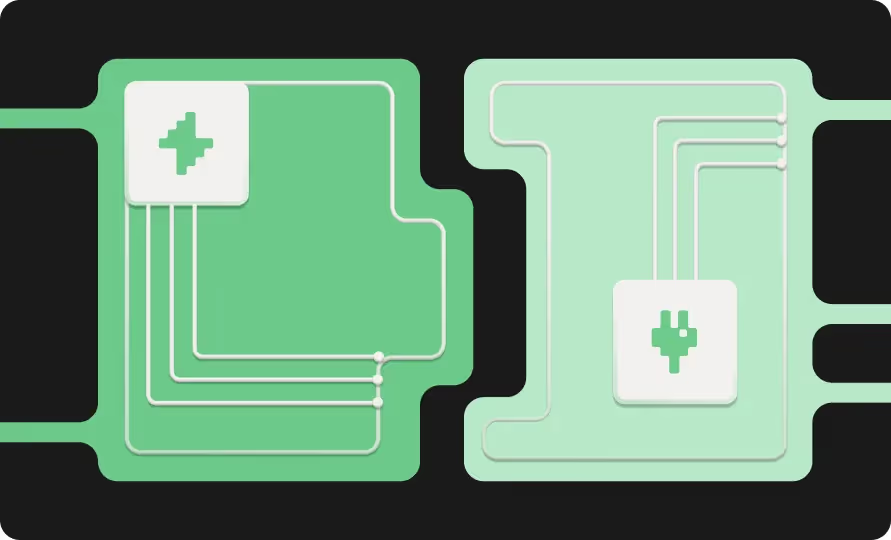

As the world’s fastest-growing jobs through 2030, data professions are essential hires for any organization wanting to improve their decision-making or implement and develop AI solutions.
But if you’ve been looking at popular career paths in data, you might have found yourself lost in vague, mealy-mouthed definitions of the differences between data analysis and data science.
Don’t let that discourage you. Even industry experts can struggle to separate them sometimes! Instead, use this side-by-side comparison to figure out which career path is right for you.
The differences between data analysts and data scientists
The key to understanding how data analysts differ from data scientists lies in each role’s purpose. Data analysts collect, process, and interpret data with a focus on explaining the present and past, while data scientists extend this work to predict and optimize for the future using machine learning techniques to build scalable, independent systems that power decisions.
It gets murky because both roles are complementary to each other. Data analysts ensure clarity and accuracy in interpreting data — data scientists then push the boundaries of what decisions can be made using predictive and prescriptive insights. Ultimately, the end goal is to support the business with smarter, data-driven decision-making capabilities.
Key takeaways
- Data analysts analyze data and provide recommendations to businesses, informed by their time spent interfacing with stakeholders and leaders.
- Data scientists make data clean and unified, then use it to construct and train models that make predictions, all with the goal to reduce human intervention.
- Both professions rank highly on global and country lists of the top fastest-growing careers and offer competitive salaries starting at the junior level.
What do a data scientist and a data analyst do
Now that you know some of the key differences between the two roles, it’s time to dig deeper into the day-to-day responsibilities of data scientists and analysts. Keep on reading to learn how programming-heavy each role is, how much collaboration is involved in their work, and more.
Data scientist job responsibilities
Data scientists work at the intersection of statistics, programming, and data, turning raw information into sophisticated predictive models that power machine learning and AI. They support their companies to achieve ambitious goals, from reducing fraudulent activity and risk, to improving logistics and operations, to developing better user experiences.
Their day-to-day job responsibilities include:
- Data integration: Extracting data, transforming it into usable formats, and loading it into a target system like a data warehouse (otherwise known as ETL).
- Data analysis: Investigating patterns, identifying trends, and using statistical methods to test hypotheses.
- Model development: Constructing and creating models that make predictions using the cleaned up data.
- Data visualization: Creating reports and graphs that present conclusions related to strategic business goals.
- Cross-functional collaboration: Working with engineers to build tools that can process data, as well as presenting findings to internal stakeholders.
Data analyst job responsibilities
Data analysts spend their time at work digging into large volumes of data and turning them into insights that help their company make data-driven decisions. They draw on data exploration and explanation techniques, creating reports that present conclusions and help leaders make informed choices across sales funnels, product development, market expansion, and more.
Their day-to-day job responsibilities include:
- Data preprocessing: Cleaning and transforming noisy, unstructured data into a unified format.
- Data analysis: Extracting insights using various data exploration and elucidation techniques.
- Data visualization: Creating compelling and easy-to-understand data visualizations that present recommendations.
- Stakeholder management: Sharing insights with internal stakeholders, such as team leaders and executives, some of whom may not have in-depth technical knowledge.
- Continuous education: Staying current on the latest trends and technologies by learning new skills.
How to become a data analyst or data scientist: Education and skills
Data scientist education, skill set, transition skills
Education:
As a math- and code-heavy profession, data scientists need a strong educational foundation in programming and technical skills. Attaining this expertise can be achieved in a variety of ways, including a college education, professional bootcamp, and by earning relevant certifications.
- Recommended degree
A bachelor’s degree in computer science, data science, statistics, or mathematics is typically required to enter into data science. Alternatively, completing a high quality bootcamp can also equip you with the skills you need to break into the profession.
- Recommended courses
Any data science course worth its salt will include courses on programming languages, databases, machine learning, AI, productivity tools, data visualization, and data science principles.
- Additional certifications
Earning certifications, such as Professional Data Engineer (Google), Professional Certificate in Data Science (Harvard), Data Science Certification (SAS), or Data Science Professional Certificate (IBM), can help show your value as a data professional.
Required skills:
- Machine learning
Using anomaly detection, deep learning, and model evaluation to craft algorithms.
- Math knowledge
Applying probability theory, descriptive statistics, time series, and regression analysis to improve algorithms.
- Data preparation
Cleaning and preparing data to produce better models.
- Data ethics
Complying with regulations such as GDPR and HIPAA to prevent data leakages and protect user privacy.
- Data management
Understanding data warehousing (i.e., ETL frameworks) and streamlining the use of machine learning libraries, such as NumPy, pandas, and scikit-learn.
Transition skills:
- SQL and Python
Learn the basics of these important programming languages for data professions.
- Basic mathematics
Make sure you have taken and understand calculus or linear algebra. - Probability
Get to know the foundations of the probability theorem. - Machine learning
Explore the application of mathematical equations to large datasets to recognize patterns.
Data analyst required education, skill set, transition skills
Education:
While some data analysts get a bachelor’s degree in computer science, statistical analysis, or a similar subject, others enter the profession after a bootcamp or online certification.
- Recommended degree
A bachelor’s degree in computer science, mathematics, statistics, or a related field is typically required to enter data analysis, but a high quality professional bootcamp can also help you learn the foundational skills you need to break into the profession.
- Recommend courses
Completing a program in data analysis should equip you with a baseline in working with databases, analyzing and interpreting data, validating findings, creating predictive models, and using data visualization techniques like dashboards.
- Additional certifications
Certifications like Google Data Analytics Professional Certificate, IBM Data Analyst Professional Certificate, Microsoft Certified: Power BI Data Analyst Associate, and SAS Statistical Business Analyst Professional Certificate help you reach career goals faster.
Required skills:
- Data preprocessing and analysis
Cleaning unstructured data and transforming it into a unified format; extracting insights by applying various data exploration techniques.
- Data visualization
Using tools like Tableau and Power BI to present recommendations.
- Programming languages
Interacting with databases using languages like SQL and Python.
- Problem-solving
Applying the right methodologies and techniques to novel problems.
- Communication
Expressing insights to stakeholders who may not have in-depth technical knowledge.
Transition skills:
- SQL and Python
Learn the basics of these important programming languages for data professions.
- Data management
Fundamentals of data management: governance, quality, security, and lifecycle.
- Spreadsheets
Brush up on your know-how with tools such as Excel or Google Sheets.
- Data visualization
How to turn large datasets into clear visuals, plus best practices for presentation for comprehension.
Data analyst vs. data scientist salary
When comparing data analytics vs. data science, compensation can be a key consideration.
And while it’s true that data scientist salaries tend to be higher than data analyst salaries, due to the more technical nature of the role, both offer competitive pay and progression opportunities.
To guide your decision-making, here’s an overview of average data scientist salary and data analyst salary figures, organized by experience level, as sourced from Glassdoor.
Entry-level jobs and career paths
Another way to understand the difference between data science and data analytics is to look at career paths and job titles, both of which should factor into your professional planning.
Examples of entry-level data scientist jobs
- Junior data scientists analyze data, create reports, and communicate findings.
- Junior data engineers manage and organize data, build and maintain databases, and manage data pipelines.
- Junior machine learning engineers perform data modeling, create algorithms, and research and build AI models.
- Junior MLOps engineers assist in the deployment, monitoring, and upkeep of machine learning models in product environments.
- Junior BI developers develop and maintain BI interfaces and work in BI tools.
- AI specialists use AI and ML techniques to develop applications and systems that can help organizations increase efficiency, cut costs, and make better decisions.
- Junior big data engineers help build and maintain data pipelines and infrastructure to collect, store, process, and analyze massive datasets.
- Junior natural language processing engineers develop and implement systems and algorithms that allow machines to understand, interpret, and generate human language.
- Deep learning engineers (early career) assist in designing, developing, and deploying machine learning models, particularly those involving neural networks.
- Junior robotics engineers develop robotic applications for the automotive, defense, manufacturing, and healthcare industries.
Examples of entry-level data analyst jobs
- Junior market analysts analyze market and target audience insights to determine product fit, price point, and demand.
- Junior financial analysts study demographics, microeconomic factors, and market trends to help companies make more informed investments.
- Junior systems analysts use data to evaluate how an organization’s IT infrastructure fits its business needs.
- Entry-level operations analysts evaluate operational procedures within a business and find ways to improve them by making them more efficient.
- Junior information analysts analyze complex data sets to surface patterns, relationships, and statistics that guide decision-making.
- Entry-level healthcare data analysts assist with medical research, help optimize workflows, and build frameworks governing data use.
- Junior AI analysts use AI and machine learning to analyze large datasets to bridge the gap between business needs and AI capabilities.
- Junior quantitative analysts use statistical methods and mathematical knowledge to analyze financial markets, manage risk, and develop strategies for the business.
- Junior BI analysts scrape together disparate internal and external data sources to evaluate strategies and identify growth levers for businesses.
- Entry-level manufacturing analysts assess production process data from machinery and tools to surface workflow optimizations and more.
As for prior experience, don’t sweat it if you’re coming from a seemingly irrelevant background. Tech employers actually want people with fresh perspectives and strongly developed soft skills.
Build your data foundation with TripleTen
Whether you light up at the prospect of working with numbers and coding or flexing your business and communication skills, TripleTen can help you put aspirations into action.
Offering eight months of part-time instruction designed for real life, our AI & ML Bootcamp delivers career-oriented training on skills and tools actually in demand with today’s employers. We also offer a job-focused Business Intelligence Analytics Bootcamp, which can set you up for a thriving career in data analysis.

.jpg)



















